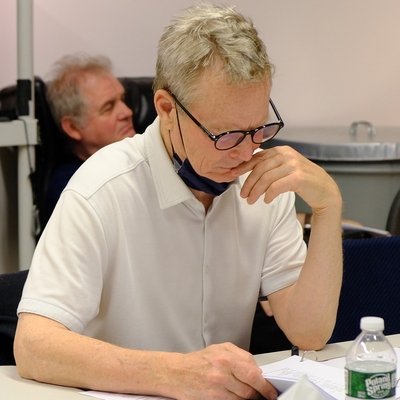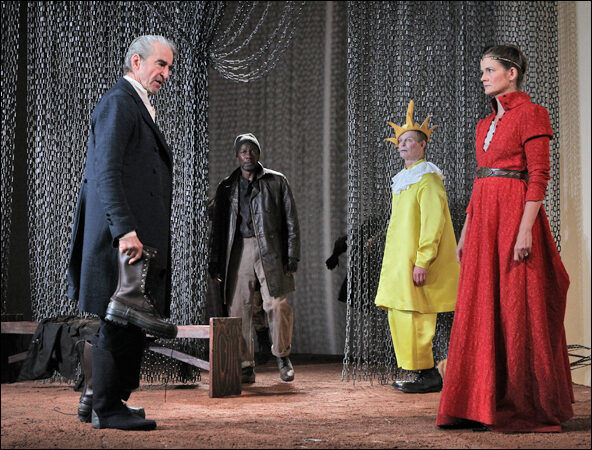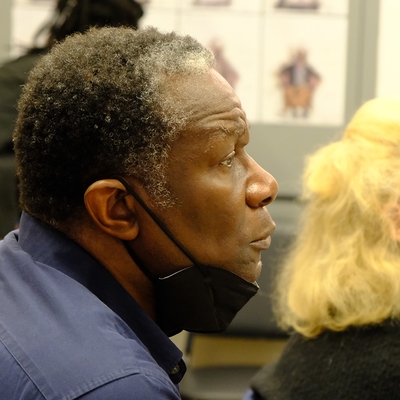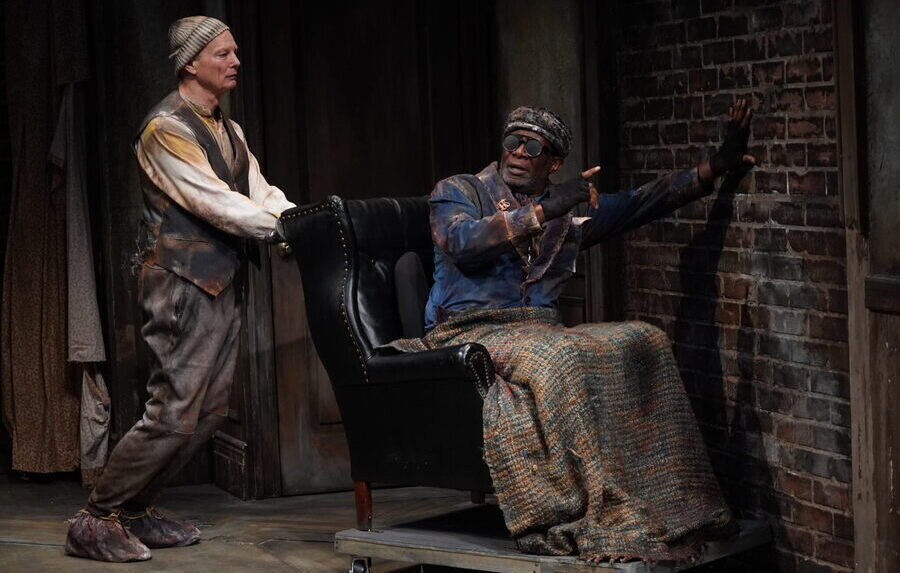Bill Irwin has been performing in and studying Samuel Beckett’s plays for decades. But he has always struggled with Endgame, the playwright’s personal favorite. In fact, in Irwin’s one-man show, On Beckett, he notes that it is a play he has tried to avoid.
Now Irwin is finally taking on this existential tragicomedy, co-starring with John Douglas Thompson at the Irish Repertory Theatre in New York, directed by Ciarán O’Reilly (now in previews, it opens this weekend and runs through March 12). In rehearsal one January afternoon, even as he pondered and took notes, he appeared to be having his worst fears confirmed. Thompson offered a suggestion: Maybe Irwin could add one of his classic clown pieces to the show, pretending to walk down a (non-existent) flight of stairs as a way of leaving the room.
In the play Hamm, played by Thompson, is blind and chair-bound, while his parents (played by Joe Grifasi and Patrice Johnson Chevannes) inexplicably live in garbage cans just out of his reach; Hamm is cared for by Clov (Irwin), who both serves and occasionally resents him. The landscape seems post-apocalyptic; the characters’ lives seem purposeless and near the end. Yet they endure, fumbling their way toward a future that seems as bleak as their present.
The faux-descent idea got batted around: As Hamm, Thompson wears blacked-out glasses and can’t move from his chair, so his character wouldn’t even see Clov’s trick exit. And Irwin questioned the wisdom of inserting a comic “bit” amid such despair and confusion. Thompson disputed the use of the term. “I leave to you,” he said, “but I don’t think you do ‘bits.’ You just do humanity.” (Irwin’s other concern, he said, only half in jest, is whether his aging knees were up to the task.)
While there’s no resentment or tension between them, Irwin and Thompson resemble Hamm and Clov in that they share an undeniable bond, despite having followed very different paths to this present moment. Irwin, 72, rose to fame as a clown and vaudevillian; he helped found the Pickle Family Circus in the 1970s and his theatrical works, notably The Regard of Flight, Largely New York, and Fool Moon remain unparalleled for their mixture of storytelling and silliness. While simultaneously becoming a star with the toddler set, hanging out with Elmo as “Mr. Noodle,” Irwin earned awards and acclaim for his stage work in modern classics from Who’s Afraid of Virginia Woolf? to The Iceman Cometh, as well as two star-studded productions of Beckett’s Waiting for Godot. He created and toured with a show called On Beckett, which dissected his long fascination with the writer and had him perform portions of his works.
Meanwhile Thompson, 59, came to theatre only in his 30s, from a role that may be the opposite of clowning: traveling computer salesman. In the last 15 years he has emerged as one of America’s finest interpreter of the classics, with memorable performances in Othello, Richard III, Macbeth, Julius Caesar, Tamburlaine, and The Merchant of Venice. He has proven equally adept at more modern works, from August Wilson’s Jitney to the one-man show Satchmo at the Waldorf. He is, however, a Beckett novice.
The two met more than a decade ago in King Lear at the Public Theater, when Irwin played the Fool and Thompson played the Earl of Kent to Sam Waterston’s Lear. While Hamm and Clov are inextricably but uneasily linked, Irwin and Thompson seem to thoroughly enjoy each other’s company, feeding off each other not just in the rehearsal room but throughout our visit and interview.
This conversation has been edited for length and clarity.
STUART MILLER: What excites you two most about doing this play, and what scares you most?
JOHN DOUGLAS THOMPSON: Bill and I have a common interest in the great writers and the great works. Since we did King Lear, we’ve been trying to find something to do together, but it just takes so long sometimes for schedules to coincide and all that sort of stuff. So the biggest thing for me was doing this with Bill. Obviously it’s Beckett and this play, but it’s also about the best pairing for the journey.

BILL IRWIN: It’s great to be on any journey with John, so that’s a joy. But as of today, I just hate this play. It is a really weird play and it’s very elusive and slippery. We’re in the laboratory still and the research laboratory is just broken.
JOHN: I do have an inherent fear of this work only because I’ve never done it. But I think it’s a healthy fear. (Irwin laughs.) It’s like forensic science with the great playwrights, where you just have to try it. The more I look into Beckett—and you look at different productions and what the lines might mean—I realize, as Bill says, that the play is incredibly elusive. Anytime I think there’s something I understand, it reveals itself to me that I don’t understand. But it’s great to be in that kind of dialogue with a play, where you struggle to kind of wrap your mind and your arms around it. To me, that’s good.
BILL: You know, there is a school of Beckett thought that it should be excruciating. But I don’t believe that.
JOHN: That’s not sustainable for an actor. A friend had contacted me and said, “A friend was in therapy for three weeks after doing Beckett.” I hope that’s not the case for me. If that was the case, I wouldn’t do it. Because it’s not worth taxing yourself to that extent. It’s tough, but at the end of the day you should be able to come to the place and say, “I like to do this.” I do have some fun playing Hamm. I have fun when I’m in this world, where we submit ourselves over to a bigger, larger idea and we become a team working on a goal.
BILL: The collaboration and the journey is fun. And then we get to offer that to an audience and say, “Here’s all the stuff we came up with.”

Do you think Beckett is purposely opaque? And if so, how does that influence your choices?
JOHN: You cannot surrender or say, “It’s so opaque and so out there that I’ll never grasp it.” It is hard to grasp, but that is the fight, at least for me. I know there’s humanity in this. These are not robots. He wrote these words for humans to say.
BILL: Work that tries to closely follow Beckett’s direction of the plays, what he did during his lifetime— from notes and descriptions—can get robotic and kind of reductive… for my money. But even if he did, it’s our responsibility to carry this piece of literature forward.
JOHN: Right, my task is to find the humanity in this fabulously dynamic, brutish character, or else it’s not real—then you’re looking at a manifestation but not a real person.
Do you think it’s easier to grasp the ideas about limitations and mortality now that you’re older, closer to, let’s say, the endgame of your lives, than it might have been if you’d encountered this piece 10 years ago?
BILL: All dramatic literature starts to resonate and make more sense when you get older, but the cruel irony, and it’s true with Shakespeare too, is that as you get old enough to wrap your head around some of these roles you’ve aged out of them. Here I’m playing someone younger than John but I’m much older than him, and I’m struggling with that storytelling challenge of being a kid to John’s old man.
JOHN: I truly think the ideas in the play about mortality do require some level of maturity and age, but also I wouldn’t have been able to approach this play 10 years ago because I needed the accumulation of skill sets that come with each play. That’s why I spent so much time with the Bard, because Shakespeare gave me a certain freedom and ability to do these other things. It’s like if you can drive in New York City, then driving anywhere else is easier. If you learn how to do Shakespeare, it opens up all these other avenues.
BILL: Beckett is like Shakespeare in the way that once it’s in your bloodstream, you have those those rhythms.
JOHN: So I’m thankful for all that has led me to this moment. I wouldn’t have been able to jump in and do Beckett back then. I wouldn’t have been able to approach the script; I’d be lost. Now I feel like I’m in a dark room, but I’m not lost. I know the dark room that I’m in. And if we can find the door…
If you find the door, will you be tempted to run out?
JOHN: It’s Beckett. The door doesn’t have a handle. We have to find the door and then make one in order to get the right fit.

Was it easy for you two to reconnect onstage and find the chemistry needed for this play?
BILL: Well, we have chemistry from back in the Lear days, when we shared a dressing room.
JOHN: There is this funny thing between Kent and the Fool. Does the Fool know that Kent is in disguise, or are we competing for Lear’s attention? We were constantly working on that in the play. I remember one time I went to do something with Lear, and Bill as the Fool was so protective that he growled. (Thompson lets loose a roar, cracking up Irwin.) I was terrified—was that Bill or the Fool?
Bill presents a unique challenge to an actor. On this collaboration, I don’t watch what Bill does, but I know there are great scenes going on. I’m truly blacked out, and my eyes are closed. So since we started rehearsing, I’ve seen maybe 10 percent of what he does. Bill is so amazing that if I watch him, I’ll laugh and I won’t be able to play my character. So that’s my relationship with Bill at this point.
Bill, your clowning is legendary, and Beckett came of age with vaudeville and silent movies, so there’s clearly a place for that in his plays. How much do you give the audience and how much do you restrain yourself to avoid distracting people from the play itself?

BILL: It’s a constant back-and-forth battle. [He acts out the temptation to clown, saying, “Ooh, ooh” as a performer about to give in and go for the laughs.] Beckett puts in a lot of business, where I look out the window and laugh, look out the other window and laugh, open the garbage can and laugh, open the other garbage and laugh, before I finally takes the sheet off Hamm and laugh again. I see it on the page but I have not found my way into that. Yet.
JOHN: Well, I’ve never seen that, but I hear it, and sometimes it sounds like you have it, even though you may not think that you do. I’ve recognized now that you have six or seven different laughs, and sometimes I want to laugh too. I can smile underneath my sheet.
I think that there’s such a strong connection between Bill’s past work and Clov. I’ve seen a lot of Bill’s clown work, and I’ve always loved the ease and the humanity in it that people respond to—no matter how wide or small his clowning is, we as an audience see ourselves in his actions. I never got the impression he was working at it; it’s not clowning that’s outside of human reality, it’s clowning that feeds off human reality. I said this earlier, it doesn’t feel like a bit. I don’t think you do bits, you just do humanity.
BILL: Thank you.

John, you have a commanding voice, but also a genuine physical presence on stage, whether you’re playing Richard III or Shylock or Macbeth. What is it like to be chairbound, and does it force you to think differently?
JOHN: It’s hard because what I usually come up with has a strong physical vocabulary. It even makes the memorization of lines harder, because sometimes I attach movement to a line. But there’s a discipline that I’m learning and I’m trusting the language more.
For all the murder and death and grief and sorrow in Shakespeare’s plays, I feel like he offers more hope for humanity. Beckett’s worldview seems bleaker. Do you two feel that difference, and how do you cope with Beckett’s perspective?
BILL: Well, I want to hear what John has to say first. (Both men laugh.)
Okay, we’ll put John on the spot.
JOHN: I do think he paints a picture of bleaker world. I think it comes from his experience with World War II. This play is infused with that feeling. I think that resonates now when everything feels out of sync and chaotic. There’s climate change and COVID and people just dying off. I think everybody started thinking about mortality, because they were losing friends or family or got so sick. That is certainly a part of this play.
BILL: In the rehearsal room we have talked about how the play connects to environmental disaster. But with all Beckett’s writing, I think of it as being inside of a head. And Beckett fought some demons. Were he alive today, he would be sort of neatly categorized in a mental health category and diagnostics. He had some real struggles. So what’s going on inside that room, where there’s a guy in the middle and the two windows are the eyes? What has the most meaning in these last few days of rehearsal is the question, how do you keep going?
JOHN: Especially when, even though there’s still an existential center, it feels today that there’s not a true center left. It’s just gone. The system that we have created is in jeopardy of falling apart at any time. That’s reflective of the country now.
BILL: “Things fall apart; the center cannot hold / Mere anarchy is loosed upon the world.” That’s a William Butler Yeats poem, or one of the bits that stuck in my mind.
What about you personally? Do you connect to that bleaker worldview more, or is that harder for you?
BILL: One of the interpretive questions in this play is, do these characters want all life on Earth to end? And there is a philosophical movement right now with folks who think, yes, my life has been nice, but really, humanity should stop. For me, that cuts against my DNA.
JOHN: I connect to the play through another sensibility. I’m trying to get at the humanity of people sharing a space and trying to live together and to move forward, in a world that supposedly has come to its end. They’re wondering, “What’s the next step?” We move forward. I find it to be quite hopeful. It’s not submitting to the frustrations of the world and saying, “I just want to end it,” it is more of a struggle to keep moving through it and finding life in that.
BILL: There’s a bitter joke in this play: They don’t have much food left but they’ve got plenty of poison. So, yes, you can use the word bleak—it’s about you ending, and the endgame. But at the end the two characters haven’t left. The question is, what will happen tomorrow? That’s the form of hope you get.
Stuart Miller (he/him), a writer based in New York City, is a frequent contributor to this magazine.


